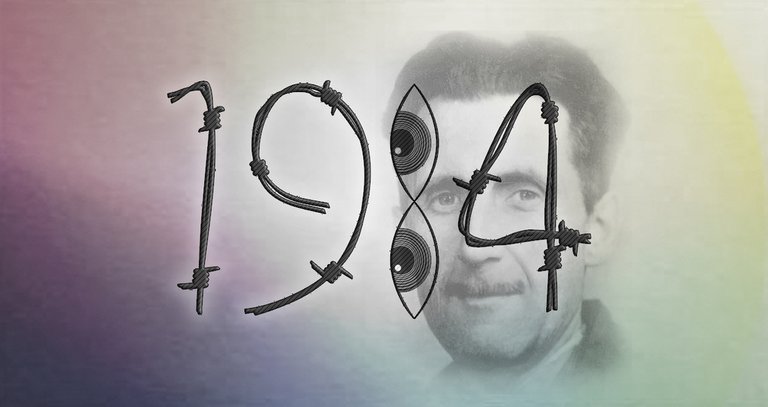How Political Satire Can Change the Future
1984: The Year That Never Was
I graduated high school in 1984, the eponymous year of a great novel by one of England's best political satirists. I read Animal Farm, another political satire by George Orwell, in high school and loved it. I didn't read Nineteen Eighty-Four: A Novel until later, but everyone in my graduating class talked about it.

Images from Pixabay and Pixabay.
If you've never heard of this novel, or read it, it delves into the nature of oppressive government, political propaganda, and personal liberty in a very powerful way through the eyes of a citizen living under such a system and who rebels to fight against it.
The novel was Orwell's last published in his lifetime. The year was 1949. Its biggest achievement is perhaps the legacy of new additions of words into the American and British lexicons. Classified as "dystopian," the novel clearly falls into the speculative fiction genre of literature. Just a few of the words and the ideas associated with it, which have become a part of everyday language, are "Big Brother," "Newspeak," "thought police," and "doublethink."
One of the measures of great literature, in my opinion, is the affect it can have on language, which itself is a type of measurement of human thought. By that measure, Nineteen Eighty-Four is one of the greatest novels ever written.
The Literary Legacy of Nineteen Eighty-Four
Nineteen Eighty-Four may very well be George Orwell's most recognized and beloved novel. The author is recognized as one of the English language's best 20th century authors by more than a single critic who matters. The novel deals with a topic that has become important to many citizens the West, particularly in nations where individual liberty is highly valued. Time magazine's reviewer loved it.
But that's not all. It's No. 66 on Time's list of 100 best novels of all time, right in front of Jack Kerouac's On The Road. NPR called it a "Top 100 Science Fiction and Fantasy Book." Modern Library ranked it 13th on its 100 Best Novels list while Modern Library readers elevated it to 6th. The BBC ranked it 8th among the top 200 novels in the United Kingdom. Earlier this month, the BBC called it one of the 100 most inspiring novels.
As you can see, the novel is widely read and admired. But why? I blame it on The Enlightenment.
A Theme That Begs for Total Allegiance
George Orwell was a British journalist, critic, novelist, and essayist. He once penned the words that would describe his ouevre:
Every line of serious work that I have written since 1936 has been written, directly or indirectly, against totalitarianism and for democratic socialism, as I understand it.
Orwell was born in 1903 and died in 1950. He'd be quite familiar with totalitarianism since some of the most brutal regimes of the 20th century thrived during his lifetime. The Bolshevik Revolution sprung up in Russia, led by Vladimir Lenin, in 1917. The Red Terror executed by his secret police, called Cheka, was responsible for countless murders between 1918 and 1922. Historians don't know the actual number, but it's likely upwards of 100,000. He was succeeded by Joseph Stalin, who ruled from 1922 to 1952 and whose death toll far exceeded that of Lenin's.
Meanwhile, in Italy, Benito Mussolini was gathering up the fascists. The March on Rome took him to power in 1922. Later, in the early 1930s, inspired by Mussolini, Adoph Hitler would capture the imaginations and passions of his countrymen in Germany. He made his first attempt at seizing power in 1923, which led to his imprisonment and the opportunity to become an author with the penning of Mein Kampf.
In 1943, Mao Zedong took over in China. He formed the Communist Party of China and established himself as chairman in 1949, the year Nineteen Eighty-Four was published.
If we could sum up the worldwide political situation of the 20th century, we'd say it was struggle against totalitarianism in all its forms, but more specifically against communism and fascism. The latter took the form of the National Socialist (Nazi) Party in Germany. Orwell saw himself on the literary front line of this ideological war. Indeed, he penned Nineteen Eighty-Four as his personal battle cry in that cause. The language of the novel has since become the rallying cry of anyone who wishes to criticize an authoritative move that may be viewed as an overreach. Many times, such a cry has been an overstatement, but not always.
Changing the Future By Not Changing It At All
Unlike Uncle Tom's Cabin, Nineteen Eighty-Four hasn't liberated anyone. There have been no Emancipation Proclamations. No wars have been fought on behalf of its ideology. One doesn't read headlines every day that champion the cause of democratic-socialist or anti-totalitarian revolutionaries. Nevertheless, compared to Harriet Beecher Stowe's impassioned plea, Nineteen Eighty-Four has had a similar far-reaching impact. And, it's more recent in the American memory.
But the impact of Nineteen Eight-Four is more preservative than transformative in the sense that the change it affects is not so much a radical shift in cultural values but an endorsement of values that, when clung to, prevent an undesirable change toward the worst. In other words, instead of moving men to make something happen, it has motivated generations of men to stop something from happening. That could effectively make it the shadow of Uncle Tom. It has freed men's minds in ways that physical liberty can't imagine.
To a trade unionist in America, Orwell wrote:
I do not believe that the kind of society I describe will necessarily arrive, but I believe (allowing, of course, for the fact that the book is a satire) that something resembling it could arrive.
In some ways, it already has. Modern China, for instance, uses facial recognition and social scoring to profile its citizens. It also imprisons minorities and dissidents, subjecting them to brainwashing and torture. North Korea is even more oppressive under the leadership of its current dictator, Kim Jong-un. The nation has a score of "3" on the Freedom House's rankings of freedom around the world, compared to China's "11." In Syria, it's even worse, with a score of "0."
Totalitarianism is a fairly new word. Born around the time of the birth of fascism, it's a term that was coined to describe Mussolini's form of rule. But the concept is as old as history itself. In fact, for most of history, the practice of totalitarianism has been the norm. You can hardly find a time in history when some empire didn't rule, and it was usually the dominant culture of the period. It was the Age of Enlightenment that brought into political thought the ideas of reason, individual autonomy, republicanism, checks and balances, and other political concepts prized by most people in the West today.
Orwell was motivated by the simultaneous rise of Marxism-Leninism and the fascist-Nazi ideologies that sparked the second world war and the subsequent Cold War. He was concerned that such totalitarian tragedies might infiltrate the United Kingdom where his roots lay. Indeed, he instilled that same fear among patriots on American shores. And because of that, citizens of free nations fought ever more vigilantly to maintain the freedoms they enjoyed, lest they lose them. So, in a way, Nineteen Eighty-Four changed the future by not changing it much at all. What one prevents ensures that one keeps what should be kept. In this case, that represents the ideals of individual liberty wrapped in the philosophies of The Enlightenment and passed on through historical documents published on both sides of the Atlantic since then.
Literature is all about ideas, and ideas dictate men's passions. Nineteen Eighty-Four, the novel and the year, came and went. But the ideas embodied in the novel still remain. They are alive and well in the age of Bernie Sanders, an American politician whose career is defined by Orwell's political sentiments. In the end, if America and Great Britain somehow manage to avert totalitarianism, it might not be because of a book written 70 years ago. It could be because the ideas in that book still animate and penetrate the only place any of us are really ever free.

Buy on Amazon.

Cryptocracy: Crypto news for less than the price of a latte.

One thing i didn't see was in 1984 Ronald Reagan sold America out to the Vatican.
I made this a while back but its very informative amd covers that day and some other crazy stuff people forget about. But its all connected.
https://steemit.com/informationwar/@johnbcheffin12/all-roads-lead-to-rome
Hi, @blockurator!
You just got a 0.44% upvote from SteemPlus!
To get higher upvotes, earn more SteemPlus Points (SPP). On your Steemit wallet, check your SPP balance and click on "How to earn SPP?" to find out all the ways to earn.
If you're not using SteemPlus yet, please check our last posts in here to see the many ways in which SteemPlus can improve your Steem experience on Steemit and Busy.